In the News Professor Jan Karlseder named Salk’s Chief Science Officer
On February 1, Jan Karlseder started as Salk’s new senior vice president and chief science officer (CSO). A professor in Salk’s Molecular and Cell Biology Laboratory, director of the Paul F. Glenn Center for Biology of Aging Research, and Donald and Darlene Shiley Chair for Research on Aging, his selection came as the result of a competitive, international search led by an executive recruitment firm and internal search committee, which evaluated a large pool of highly qualified candidates over 10 months.
Karlseder will maintain his faculty position and lab, while working with Salk President Gerald Joyce to develop and implement the Institute’s overall scientific strategy, as well as oversee research operations in support of this strategy, including the grants development, scientific core facilities, and animal resources teams. Karlseder succeeds Professor Greg Lemke, who had served as CSO since April 2023.
“The CSO plays a critical role in supporting the faculty, elevating our research, and identifying new opportunities for partnerships and research funding,” Salk President Gerald Joyce says. “We had a long list of qualities we sought in a CSO and Jan fulfills them all—he is an internationally recognized scientist, admired leader, and excellent communicator, and he has experience in philanthropy. We are grateful to Jan for accepting this role, and I’m excited to see what we’ll accomplish together.”
Karlseder grew up in a remote part of Austria, where he was surrounded by nature and by family members who shared their love of science with him. His father was an engineer and his grandfather was a professor of botany at the University of Vienna, often taking Karlseder and his siblings for hikes, where he shared his knowledge of flora with them. Though he had these influences, Karlseder says becoming a biologist “just happened.” His interest in the field led him to attend the University of Innsbruck, where he earned a bachelor’s degree in biology. From there, he attained his PhD in molecular biology from the University of Vienna, and completed a postdoctoral fellowship at Rockefeller University in New York.
“We had a long list of qualities we sought in a CSO and Jan fulfills them all—he is an internationally recognized scientist, admired leader, and excellent communicator, and he has experience in philanthropy. We are grateful to Jan for accepting this role, and I’m excited to see what we’ll accomplish together.”
–Salk President Gerald Joyce
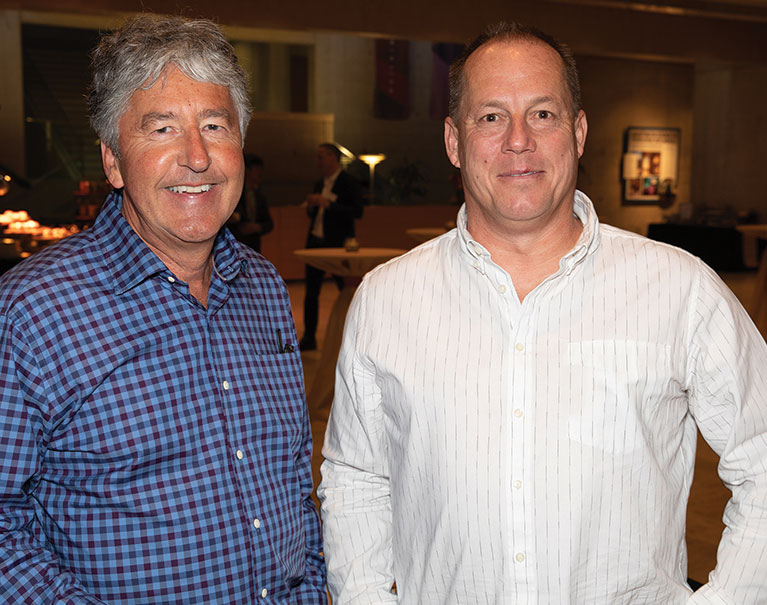
Karlseder has been a member of Salk’s faculty since 2001. When he visited the campus, he says he “was captivated” by the Courtyard’s beauty and creativity. His current research focuses on telomeres—the caps at the ends of chromosomes that shorten as we get older. Telomeres regulate genome stability, inflammation, cancer initiation, and other crucial cell activities. Karlseder is focusing on a novel pathway that links telomeres to inflammation and mitochondrial health, where these three hallmarks of aging and cancer interact to remove precancerous cells from our bodies. The findings from this work will help us better understand aging and age-related disease, and could also reveal new ways to inhibit cancer.
Karlseder has received numerous awards throughout his career, including the V Foundation Award for Developing Scientists, a Forbeck Scholar Award, and the Glenn Award for Research in Biological Mechanisms of Aging. These honors highlight his innovative vision and high standards for ethics, integrity, and inclusion in science.
“I am excited to take on this new challenge in support of the Salk Institute’s faculty and our outstanding science,” Karlseder says. “I look forward to working with Salk’s leadership team, scientific cores, facilities, and staff to promote our mission and what we do best: making impactful discoveries in fundamental science in an inclusive and welcoming environment.”
Support a legacy where cures begin.
Featured Stories
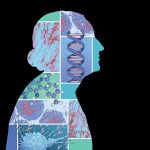 Interaction + Infrastructure = Innovations in Healthy AgingSalk formula recalculates aging research, shifting focus to overall resilience and health span.
Interaction + Infrastructure = Innovations in Healthy AgingSalk formula recalculates aging research, shifting focus to overall resilience and health span. Professor Jan Karlseder named Salk’s Chief Science OfficerOn February 1, Jan Karlseder started as Salk’s new senior vice president and chief science officer (CSO).
Professor Jan Karlseder named Salk’s Chief Science OfficerOn February 1, Jan Karlseder started as Salk’s new senior vice president and chief science officer (CSO). 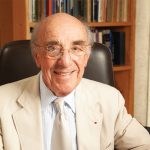 Salk mourns the loss of Nobel Laureate Roger GuilleminThe Institute remembers the “father of neuroendocrinology” for his many contributions to science and friendship to all.
Salk mourns the loss of Nobel Laureate Roger GuilleminThe Institute remembers the “father of neuroendocrinology” for his many contributions to science and friendship to all.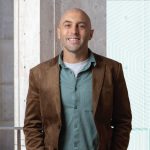 Daniel Hollern–Turning a cancer diagnosis into a career in basic researchAssistant Professor Daniel Hollern pivoted his career trajectory after a family member’s life-changing diagnosis pushed his already-curious mind off a cliff of questions—starting with, “What can I do to help him?”
Daniel Hollern–Turning a cancer diagnosis into a career in basic researchAssistant Professor Daniel Hollern pivoted his career trajectory after a family member’s life-changing diagnosis pushed his already-curious mind off a cliff of questions—starting with, “What can I do to help him?” Jerry Sheehan–Collaborating shoulder to shoulder with scientistsWhen you think about a person who heads an information technology department, you might not envision them working shoulder to shoulder with research scientists. But that’s exactly the approach Jerry Sheehan is taking as Salk’s new chief information officer (CIO).
Jerry Sheehan–Collaborating shoulder to shoulder with scientistsWhen you think about a person who heads an information technology department, you might not envision them working shoulder to shoulder with research scientists. But that’s exactly the approach Jerry Sheehan is taking as Salk’s new chief information officer (CIO).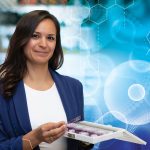 Laura Mainz–Taking control after a cancer diagnosisLaura Mainz grew up in a tiny village in midwestern Germany, with just as many cows as people. But the sweeping landscape speckled with farms never swayed her toward plant biology—instead, her interest in the human body grew.
Laura Mainz–Taking control after a cancer diagnosisLaura Mainz grew up in a tiny village in midwestern Germany, with just as many cows as people. But the sweeping landscape speckled with farms never swayed her toward plant biology—instead, her interest in the human body grew.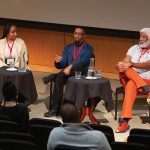 Black Association affinity group cultivates welcoming environmentThe Black Association at Salk (BAS) was one of the first affinity groups formed at Salk in 2020. Since that time, it has established itself as a welcoming space and go-to for resources for all Black Salk community members.
Black Association affinity group cultivates welcoming environmentThe Black Association at Salk (BAS) was one of the first affinity groups formed at Salk in 2020. Since that time, it has established itself as a welcoming space and go-to for resources for all Black Salk community members.



















































